OG 01 vs BH 03
I'll be following episodes according to OG's timeline, and comparing them to the Brotherhood episodes that cover the same content.
Fullmetal Alchemist Episode 1: "Those Who Challenge the Sun"
Wikipedia's plot summary:
In a brief flashback, the Elric brothers Edward and Alphonse had attempted to perform an alchemical transmutation in the hopes of bringing their late mother back to life, but they had failed in doing so. As a consequence, Al disappears, Ed loses his left arm, and a grotesque figure appears in the transmutation circle. In the present, the brothers walk across a desert. They arrive at Lior, where they hear about a religious leader named Father Cornello who can create miracles. However, as they realize that he is performing alchemy and ignoring the law of equivalent exchange, they believe that he possesses the philosopher's stone, which they had been searching for to restore Al's body. Threatened, Cornello orders Cray to kill them. Rosé, a girl the brothers meet, is traumatized after witnessing Al's lack of a human body, runs to Cornello. The Elrics follow her, and Cornello releases a chimera on them when they meet. Cornello also transmuted a giant bird from a parrot and sends it to fight against Ed, who fends both of the chimera and the bird off by exposing his automail, his metal arm and leg. Cornello then realizes why Ed is nicknamed the "Fullmetal Alchemist", understanding that the brothers had committed the ultimate sin of human transmutation.
I like this episode a lot as an introduction. It uses in-medias-res excellently, with a shocking opening that makes us wonder what happened to the brothers and how they're still alive four years later. It's immediately followed by a funny opening scene that functions as a palate cleanser for the horror we just witnesses while also establishing the brothers' dynamic with each other, as well as hinting at alchemic mechanics ("If only there was some grass, I could turn it into bread").
I wanted to do a spittake when I saw Ed was only 15 in the present day, though. That's some YA level absurdity there. I somehow remembered him being older. (I also feel like it's rather undermining the horror of his automail stunting his growth -- that's not immediately apparent if he's not supposed to be fully grown in the first place. There are definitely 15-year-olds who are as short as him naturally.)
We get another funny scene when they finally make it to Liore; Ed is exhausted and blames Al, but Al points out he's only tired because he chased Al so hard. This is, again, a really nice and succinct way of establishing their characters and relationship.
Ed finds a fountain in the middle of the city, and discovers it's pumping wine. This is a really nice detail that fleshes out the city, and shows how Cornello's miracles are affecting their everyday life. He's not just making some flashes to wow people, he's actively changing the city and giving people something tangible to believe in. What I think is most important about this detail is that it adds nuance to this conflict. Cornello really is bettering the city and giving the hopeless something to believe in. These people aren't just following him because they're idiots; they are truly desperate. The heroes may be liberating the city from his manipulations, but they're taking good things away from the city too.
The Elric brothers find a bar and Ed finally gets a drink. The bartender turns on the radio -- a detail that shows this isn't your typical fantasy story, but one with an early 1900s tech level. We hear Cornello's broadcast, and the shots decompress to give us time to take it in. We pan over the city, see how everyone reacts to the broadcast, and see Ed's reaction to it as well.
This is the point where we catch up to the manga's opening. The bartender asks if they're street performers; Ed gets affronted, and says only vaguely that they're here to "look for something", piquing our curiosity. Ed asks about Cornello and the entire town suddenly crowds in to tell him the good word, which is both funny and an effective means of conveying exposition. They make explicit what was implied by the fountain of wine: their desert town is normally inhospitable, but Cornello made it better.
Al stands up, and breaks the radio by accident. Ed offers to fix it, but Al volunteers instead. This is our introduction to alchemy, and it's given appropriate weight. We linger for some time on the transumtation circle, and there is dramatic music. Like the radio, this is an effective way of showing what's special about this world -- we linger just long enough to take it in, without making us get bored.
Ed tries to introduce himself, expecting his reputation to proceed him, but the townspeople are unimpressed. An eavesdropping Lust, however, introduces him as the Fullmetal Alchemist. Her behavior is framed as suspicious...
But we don't think about it too much because the townspeople immediately mistake Al for the Fullmetal Alchemist, and Ed comically overreacts at the affront. LOL. In the process, we establish that Ed has a complex about being short.
Then Rose shows up. She offers to take them to church and Ed accepts, hoping they'll find something there. As they walk away, we get a quick scene with the townspeople where they hint that something bad happened in Rose's past, but they don't give specifics. Tantalizing! The camera prominently focuses on Lust leaving suspiciously.
Ed then wonders if they've seen "that woman at the shop" before. I think he's referring to Lust, but I don't know where they would have seen her before. Edit: Found a better translation. He's saying he doesn't know her, and wondered how she recognized him.
Rose tells Ed he'll get taller if he prays, and I get the impression she's purposefully saying it to get a rise out of him, which is funny.
We cut to Cornello finishing the broadcast. Rose arrives, and it becomes clear she is expecting a miracle in exchange for her service. Cornello strings her along, telling her her good work is recognized but it is not yet time.
The next scene finally tells us what's going on with her: As the brothers bed down, Alphonse reveals he's asked around, and discovered Rose is mourning the death of her lover. She has no family, so she is lost and desperate to have him back. Ed looks angry, and firmly rejects the idea that the dead can come back.
We cut to the next morning, where Cornello is doing a demonstration of his miracles. They very explicitly pay homage to Jesus: he turns water into wine, and brings a bird back to life. He also turns a log of wood into a stone statue. His ring glows prominently every time, making its relevance painfully obvious.
In the crowd, Ed and Al discuss whether they're real miracles. They say it's clearly alchemy, but he ignores some physical laws. This segues into exposition on the limitations of alchemy and equivalent exchange. Al explains that alchemy follows conservation of matter: he could not have turned the broken radio into a bigger radio, "or a piece of paper, or a tree," though I'm skeptical of that last part -- one of Ed's favorite techniques is turning stone into a metal spear, so they clearly can change the material, not just rearrange it. We can even nitpick further by pointing out that alchemy clearly ignores conservation of energy and matter is just energy, so really they should be able to do anything. But hey, I'm here for scientific magic, so I'm willing to see if they can keep it consistent.
We cut to Cornello in his office again. He is paranoid that the arrival of a State Alchemist means the state is going to expose him, and orders that the Elric brothers be disposed of.
I always find it really dumb when characters do this. If you send an investigator after something and they mysteriously go missing, that draws more attention, not less. But Cornello isn't the sharpest tool in the shed, so alright, he's panicking. To his credit, he really keeps his cool; he does not break character, insisting that he's doing this to protect the city, and he leaves his ugly orders subtle and implicit.
We're also told Ed became a State Alchemist at twelve and I have just entered a brain-killing fever. I'm just going to mentally add three years to their ages from now on.
At the last minute, we see Lust is working with Cornello as well.
The next scene starts with Rose in the church. Ed sneers at her for believing God will resurrect the dead. I really like her reaction:
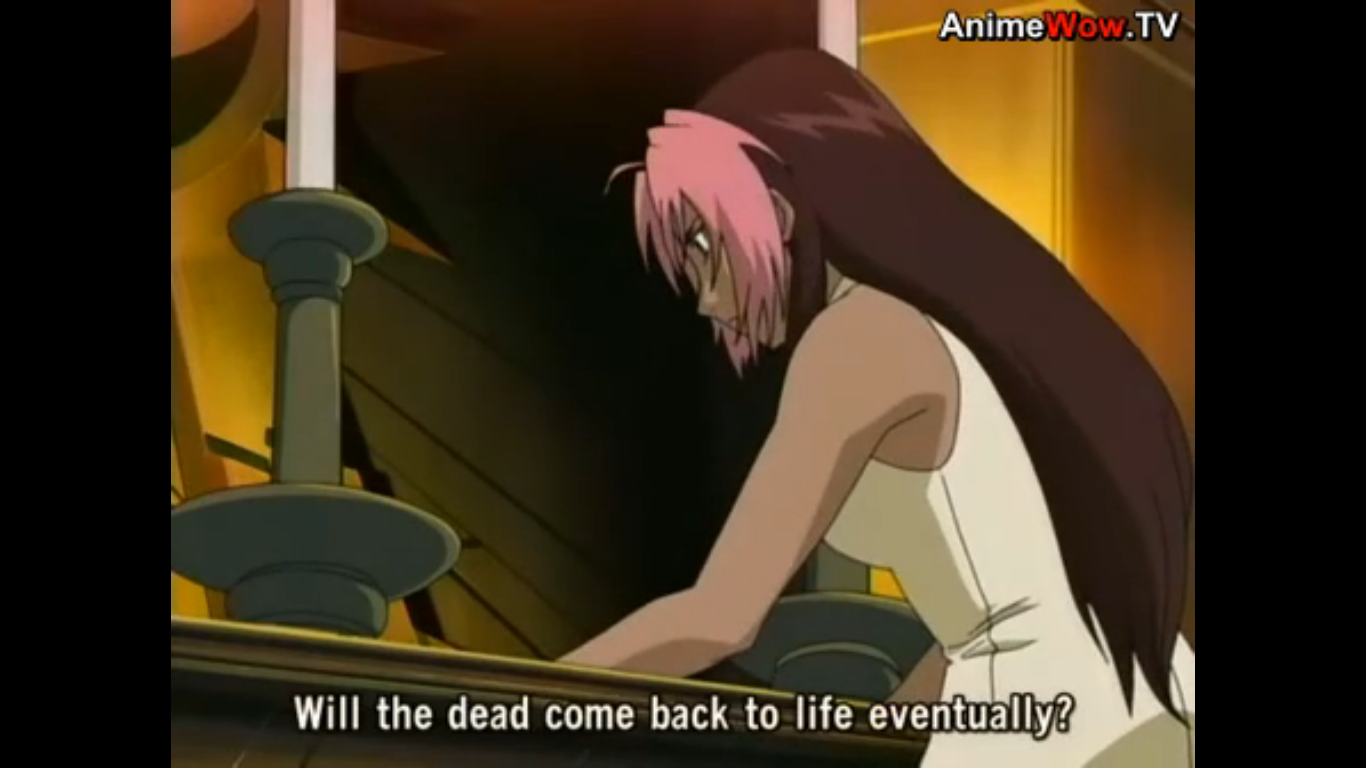
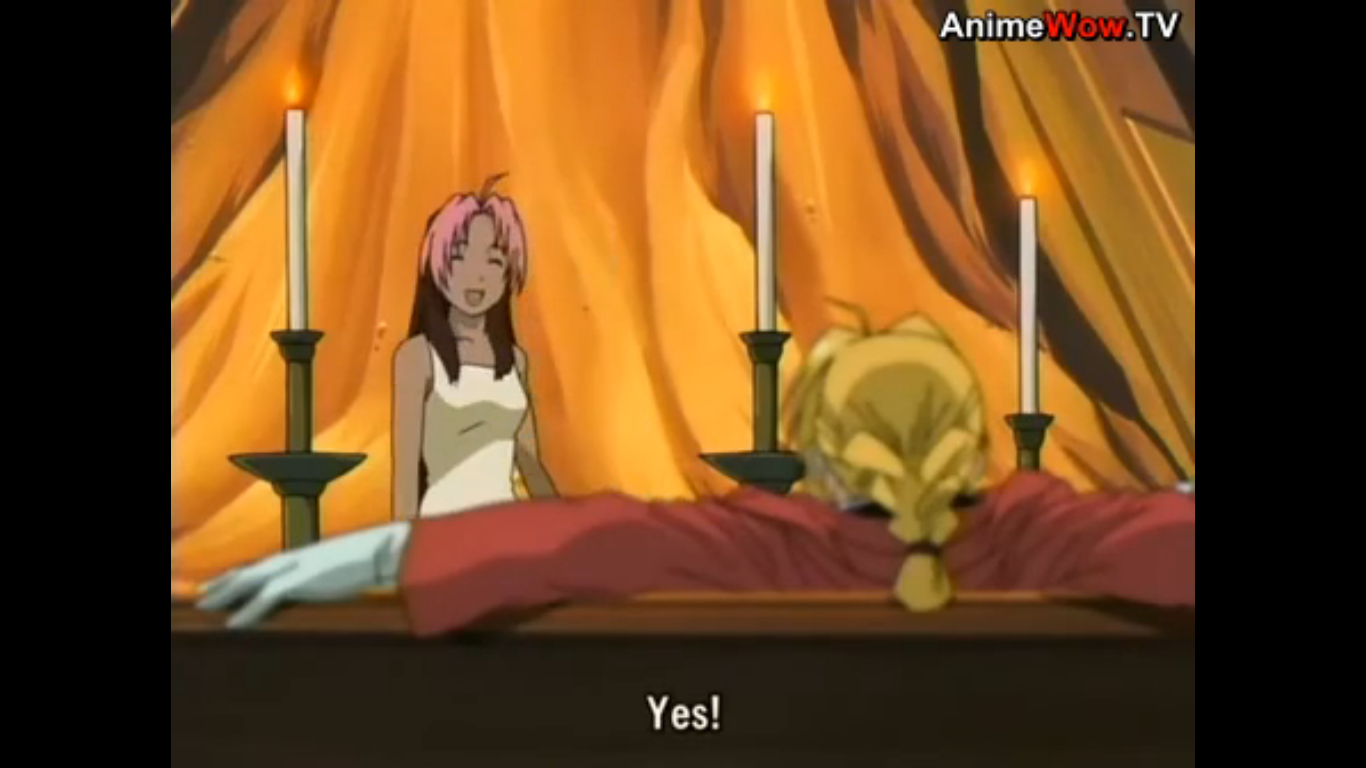
Look at the detail of those expressions. There is so much pain and frustration at this unwelcome intrusion as he twists the knife so painfully, yet she still manages to compose herself and plaster on a fake smile. This adds incredible depth to her character. She clearly has practice repressing dark thoughts and putting on pleasant facades. Where did she have to learn this? How awful it must be for her to have to live like this. She's only a side character, but already I'm feeling so much sympathy for her -- more than I'm feeling for Ed at this point. He's being such a dick to her!
Ed grandstands, pulling out his book and reading off his list of the human body's ingredients. Rose has a serious reaction:
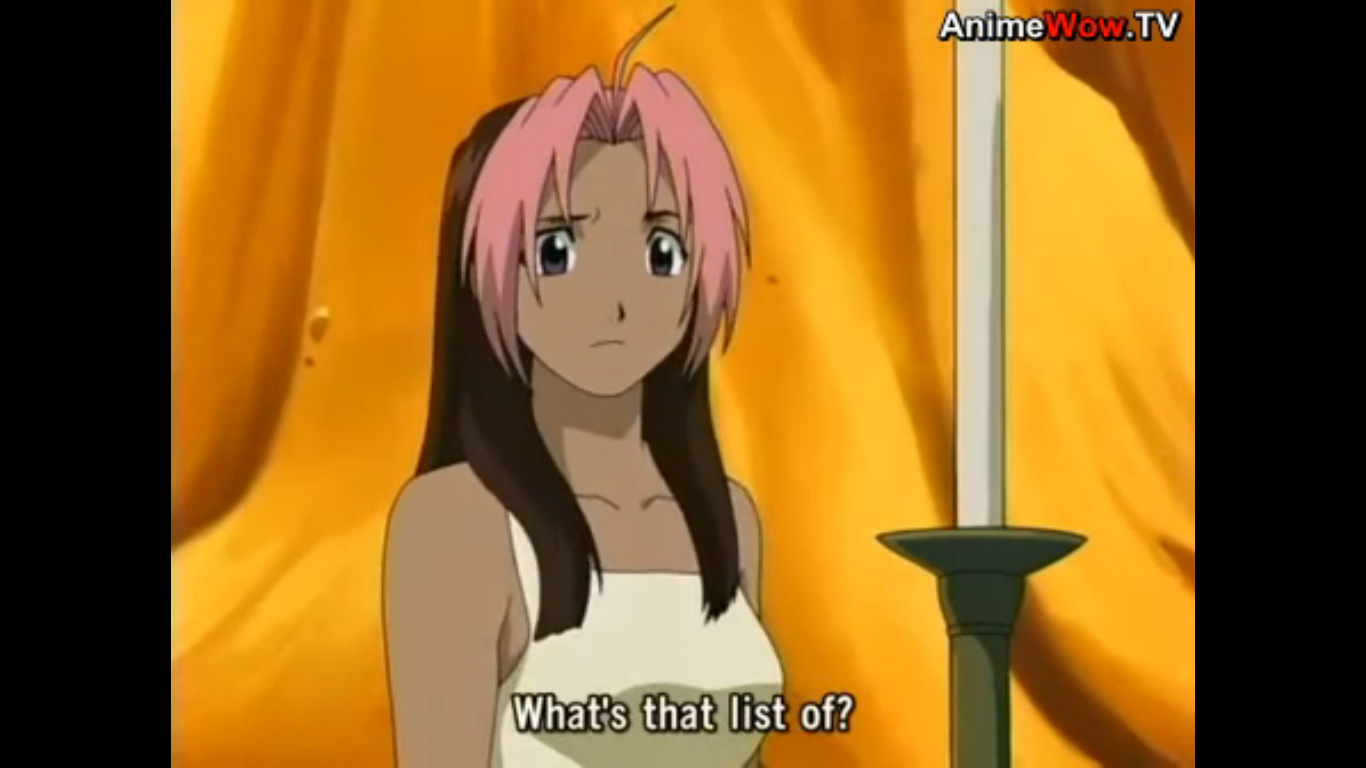
Ed explains it's the ingredients of a human body, and then moves into his real point: scientists know all this, but there's been no successful case of creating a real human through alchemy. Despite this, Ed believes that through hard work, they'll eventually find a way, unlike merely praying for a miracle. He then callously mentions that these materials can be bought cheaply. The camera maintains focus on Rose the whole time, who slowly loses her composure until she snaps at him with indignation.
Ed stands up, but seems to have some difficulty, leaning on the pew to support himself. Nice foreshadowing there.
Ed smarms that despite rejecting God, alchemists are the closest humans have come to him; Rose snaps that he's not God, and Ed counters that neither is the sun, and makes a vague statement about getting burned if you venture too close.
This is an incredibly powerful scene. The framing makes this feel as tense as a fight scene -- because in a way, it is, but one much more important than a mere clash of weapons. This is a battle of philosophies, and that's what this series is truly about. We're made to wonder why Ed speaks with such conviction -- from the opening, we know his attempt to bring his mother back failed horrifically, so who is he to act like he knows the truth? Rose is a worthy opponent -- her counterarguments are not just the talking points of an evangelical robot, but real arguments with real emotion behind them. We know there is so much subtext under everything they say -- both of them have lost people they love, and both of them cling so strongly to their respective coping methods. Ed doesn't come out the clear victor here.
Then suddenly, it's action time! Clay tries to assassinate Al, and in the process we discover that there is nothing inside his armor. Ed knocks him out with a quip, showing he's used to this kind of violence, but Rose has a breakdown. Al tries to explain that this state is punishment for trespassing in Things Man Was Not Meant To Know, but Rose just runs away in horror. The brothers pursue, and find Rose has led them into Cornello's trap.
Ed accuses him of having the Philosopher's Stone, and reveals that's what he's been looking for. Cornello admits to it, but once again does a good job of keeping up the act: he claims the Stone is a gift from God, and points out that he's done real good for the town by reviving it from the ravages of war (a theme that will become important later). Rose outright accuses them of selfishness by wanting to steal their hope.
Cornello's opening attack is to transmute the floor to sand, sinking Al -- something that was foreshadowed in the opening. Clever. Cornello then sics his chimera on Ed (with some exposition), who makes a spear out of the sand. But I thought you said alchemy couldn't change materials, Ed. Possibly it's supposed to be pure silicon? That might explain why it breaks so easily.
Cornello then turns the bird he revived earlier into a huge raptor, which crushes Ed's spear with its claws. It then tries to do the same to Ed's leg, but fails -- which I guess is confirmation the spear can't be a strong metal. Ed punches it out, but is attacked by the first chimera, which similarly fails to tear his arm off. Ed tears his coat the rest of the way off, revealing his automail.
And that's where we end! Cliffhanger!
FMA Brotherhood Episode 3: "City of Heresy" (part 1)
Brotherhood compresses this arc into one episode, so for now we'll only cover it up to the same point as OG.
Wikipedia's plot summary:
Edward and Alphonse arrive at Liore, where they witness Father Cornello gaining the devotion of the townspeople by performing "miraculous" transmutations, which they believe could only have been accomplished using a philosopher's stone. They meet Rosé and request to see Cornello. When Cornello realizes that Edward and Alphonse are alchemists, he ambushes them with a chimera. While battling the chimera, Edward unintentionally reveals his prosthetic automail limbs, and Cornello realizes that he had attempted the taboo of human transmutation.
As to be expected from compressing two episodes into one, this episode feels incredibly rushed in comparison. There's not even the opening scene in the desert -- we start with the Elric brothers already in the city and listening to the broadcast. They don't spend as much time talking about Cornello (no specific good works are mentioned), Rose and Lust don't appear, and fixing the radio is much faster. Ed doesn't offer to fix it first, which is a reasonable minor detail to cut but I thought it was a good bit. Once again, this only makes sense if you assume the audience is already familiar with FMA and doesn't need this exposition and character establishment.
The townspeople recognize Ed on their own and once again mistake Al for the Fullmetal Alchemist, and... here is where we get introduced to one of Brotherhood's aesthetics I hate: the cartoon shift.
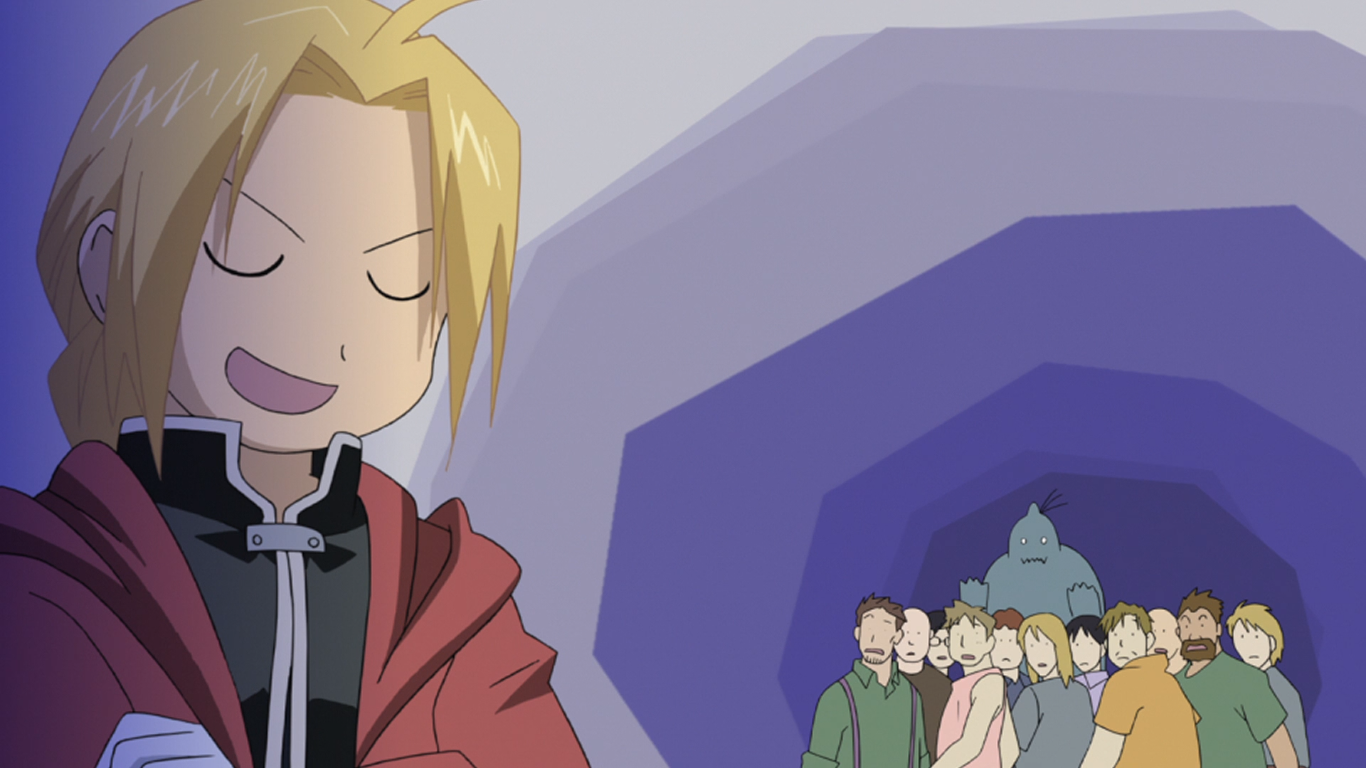
I know, I know, this is a legitimate technique in anime and manga. I don't think it's inherently bad, and it can actually work really well in works that don't take themselves too seriously, provided this level of comedy is appropriate.
...And I just don't think that's the case for FMA. FMA, even Brotherhood, is a very dark and serious story with a lot of violence, death, and heavy themes. And like. Maybe it could still work if the cartoon shifts were restricted to only a few scenes, but they're not. Brotherhood does it all. The. Time. Even in the middle of serious scenes. And that completely kills the mood for me. I cannot take anything in Brotherhood seriously, simply because it never knows when to stop. This case is a genuinely comedic scene, so it's not egregious this time, but oh, it will get worse. This very episode, in fact.
We immediately jump to Cornello's demonstration instead of waiting a day. He only does one miracle, turning a flower into a... crystal? The stone's influence is less painfully obvious -- it's prominently displayed, but doesn't glow. The Elrics still exposit about the law of equivalent exchange, but it makes sense because they have no one to exposit to (Rose isn't introduced yet). Alphonse also claims that changing vegetable to mineral is a violation of equivalent exchange.
We then jump straight to the church scene. This is our introduction to Rose. I feel like Ed now looks like a bigger dick because he doesn't even know this person -- in OG he had a reason to talk about God and resurrection, and he was actually trying to help her even if he was terrible at it. Here he just spits on her faith for no reason.
Rose still has her bit about prayer making him taller, but it's in cartoon style, and a sound effect helpfully informs us she's being sincere, so she no longer gets the dignity of clapping back to Ed.
Then we get Rose's reaction to Ed listing body materials:
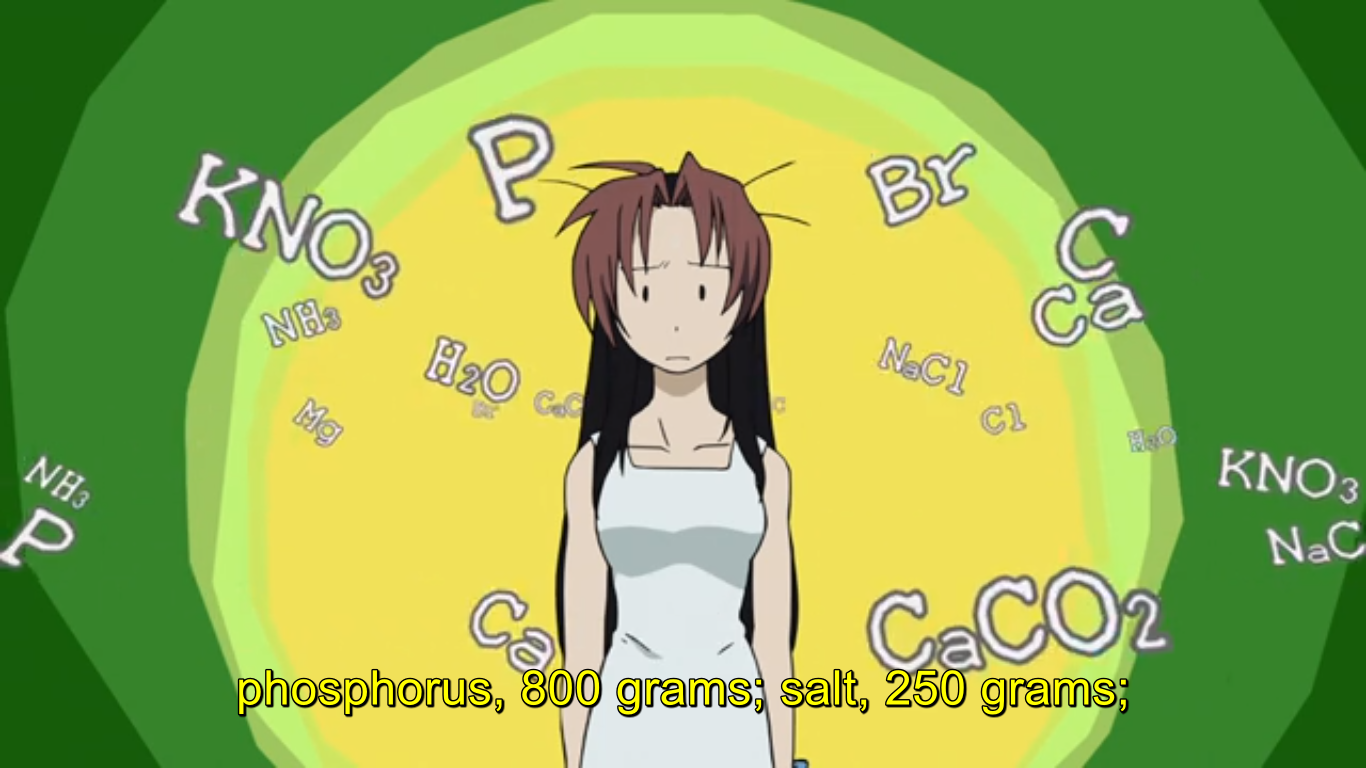
HA HA, THE DUMB COUNTRY GIRL DOESN'T UNDERSTAND THE EDUCATED MAN. LAUGH.
This is not an appropriate time for comic relief. It may not be immediately clear, but Ed is trying to have a serious philosophical conversation by touching on the trauma that defined his life. This is an incredibly important scene to both characters, but now I can't take it seriously at all. Similarly, Rose's responses sound silly -- they're robotic evangelical cliches, not anything grounded in her own situation or true emotion.
Why? I think it's telling that when Ed gives his line about humans being cheap, the camera focus is on him instead of Rose.
Rose isn't important in this scene. She's just an object for Ed to talk at to show how much smarter he is. (But tell me more about how Brotherhood treats its female characters so much better.) OG challenged Ed here; BH just validates him. In both cases, that's very telling of how the story will ultimately shake out.
Then out of the blue, Ed does a 180 and says he wants to meet Cornello, praise God! Rose sees nothing suspicious about this.
We then get the meanwhile scene where Cornello fears the state is closing in on him, but he's much more pathetic. He's visibly sweating and emotional, slipping up multiple times.
The Elric brothers visit Cornello's estate and the climax takes place there. Similar thing where the secretary tries to kill them, but Al doesn't lose his head.
Cornello shows up and tries to pretend he wasn't trying to kill them and very badly denies the allegations he's using alchemy. What is the point of this?
Then Cornello appears to make a statue out of literally nothing.
Cornello tries to convince Rose to kill the Elrics instead of just killing them himself, because...?
Cornello also gives the exposition about her boyfriend here, while Rose is being a pathetic frail woman and hesitating.
Rose levels the gun at Al and we get ANOTHER comedy scene where Ed is affronted at the mistaken identity because now is definitely the right time for comedic relief.
Rose shoots Al by mistake (I think?) and this is where we learn he's an empty suit. Except the backstory episode is before this in Brotherhood so we already know, so the impact is kinda lost.
Now Cornello decides to summon the chimera, finally. In this one, Rose is still down there with the Elrics in the line of fire.
The chimera's claws break off when it tries to claw Ed, which is ridiculous. The chimera in general is a lot more pathetic: we hear it whine and see it have pained expressions when Ed kicks it. I honestly feel bad for the poor thing.
Ed tearing his coat off is the same, but he looks more generically bishonen (less muscle definition). I'll admit that this does make sense with the idea he's a growth-stunted 15-year-old.
The mid-episode break corresponds exactly with the end of OG's first episode, so I'll end it here.
Bạn đang đọc truyện trên: AzTruyen.Top